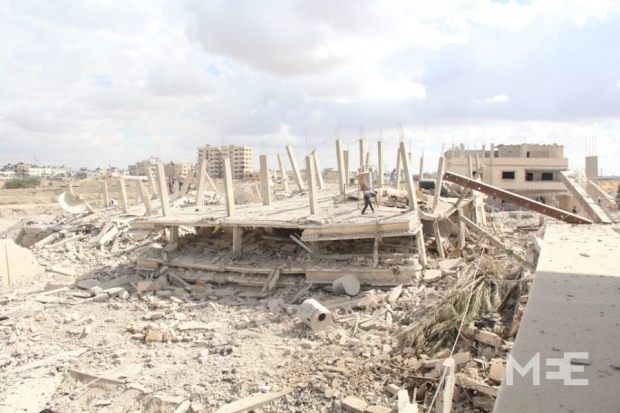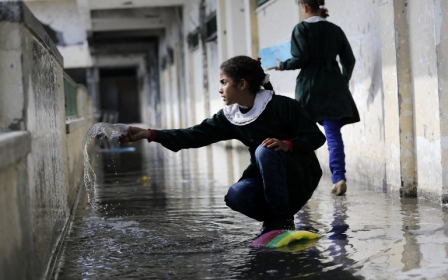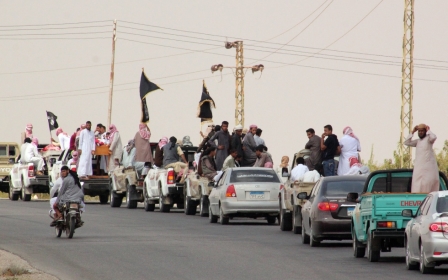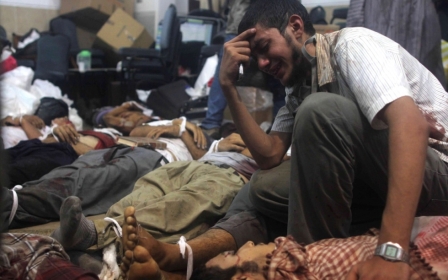Egypt’s Sinai demolitions reverberate back in Gaza

RAFAH, Gaza: “Bombing bombing… they are bombing again,” three year-old Lutfi Ebid shouts while running onto the doorstep of his family home in Yibna refugee camp, in Rafah in southern Gaza.
The boy’s aunts and father try to comfort him and reassure him that an Israeli war is not about to reignite and that this summer’s 50-day war is all finished and will not happen again.
Despite their soothing words Lufti’s keeps his hand clasped tightly onto his six year-old sister’s hand. His sister Lamia too repeats her father’s assurances that war is in the past - but Lufti remains agitated and unconvinced, the fear in his eyes clearly visible.
What the little boy can’t grasp is that the bombardment this time, is not aimed directly at the Ebid area, but it is just a few hundred metres away from their three story building, across the border in Egypt where Egyptian troops are blowing up the homes of Egyptian nationals living close to the Gaza border, in a bid to create a wide buffer zone.
The Egyptian government believes that the smuggling tunnels have been used to carry out attacks against the Egyptian military, which have intensified recently, although Hamas officials have said that the border with Gaza is secure and that it would not allow these kinds of threats to spill over.
With every bang and crash that occurs on the other side of the border, however, visual remnants of exploded shrapnel fly into Gaza, scattered around homes in Ebid.
As Lutfi’s 25 year-old uncle, Mahmoud Ebid, tries to convey to his nieces, his words are interrupted when yet another explosion takes place nearby, sending smoke and shrapnel to shower Gaza’s streets where young school children are still having to run for cover.
Widespread confusion has ensued. No one wants to believe that these bombardments are being carried out by Egypt. People cannot contemplate how Egypt could possibly help start another war on Gaza after what happened during this summer’s war when more than 2, 100 people including 495 children, lost their lives. Complicating matters further is that very few know what is taking place on the Egyptian side of the border.
“These bombings happen suddenly and without warning,” said Mahmoud Ebid, as he walks into his second-floor building overlooking the border with Egypt.
Across the border one can see Egyptian troops in armoured vehicles, planting explosives underneath homes and taking cover under their army-coloured vehicles but Ebid can’t see much else as his windows have been cracked and shattered by the explosions.
He used to think that warmth was his family’s number one needs in the wintry air, but the reverberations of the bombing means that the cold breeze flowing through the house is no longer the primary worry.
“Now we had no option but to remove the remaining glass windows to avoid more splintering with explosions,” he told Middle East Eye.
Glass for windows is a precious commodity when surrounded by bombs and war, with little chance Ebid and his family will be able to replace in time for winter, putting hundreds of families in southern Gaza in further danger.
“It is the right of Egyptians to take care of their security, but the explosives they use are causing too much damage to us, too,” Ebid said.
When a demolition went off a few days ago in the Egyptian side of the border, Rafah resident Khaled Abu-Taha said he found himself running out of the shop frantically searching for children to find out if they were safe.
His children were luckily upstairs above the store unharmed but the windows in the house and shot largely shattered, leaving Abu-Taha struggling to cope.
“Who will offer me window replacement? The Egyptian government, or Palestinian consensus government, which has offered nothing during or after the summer bombardments?” he said.
Troubles in Sinai
The restive Sinai Peninsula has long been a hotbed of tensions that have intensified since the overthrow of Egyptian President Mohammed Morsi in July 2013. While attacks on security services and tourists all happen from time to time, recent weeks have seen a spate of deadly attacks with 31 Egyptian soldiers killed in just one day last month.
The incident pushed Egypt to intensify its crackdown on the Sinai and vow to create a barrier with Gaza, which requires the demolition of homes located in the designated border area. According to Egyptian plans, eviction and destruction of homes is happening in stages. The first stage is to target and evict approximately 802 homes that house 1, 165 Egyptian families within 500 meters of the Egyptian borders.
The governor of North Sinai, Abdel Fatah Hrour said his government will offer lands in compensation to people whose homes have been destroyed, although residents have argued that this is not enough.
Local authorities surveyed families in the area to establish what their preferred compensation would be. Some 65 percent asked for financial aid and 29 percent asked for financial compensation, plus a suitable piece of land. Two percent requested alternative apartments from the state. So far, however, 78 households have been told that they will not receive alternative compensation, after authorities discovered to have tunnels hidden underneath them.
“We have already asked people in [the border town of] Rafah to present documents proving that these homes belong to them,” he said.
The news is likely to have deep reverberations in Gaza, which has depended on the tunnels to fuel its economy since the imposition of the Israeli blockade in 2007.
The damage so far has devastated areas close to Yibna, a refugee camp on the Gaza side of Rafah town. Down the road is Al-Barahma neighbourhood, which was divided when the separation wall was built between Gaza and Egypt in 2009. When it was constructed, several residents explained that it felt like those divided by the Berlin Wall must have felt. In both cases the wall divided people, and in many case even families.
After the Gaza wall went up, half of residents found themselves being governed by Egypt while the other half remained on the Palestinian side.
Now as the families on one side suffer and watch their homes demolished, their relatives on the other side of the fence are also feeling the blowback.
Ebid said that since the demolitions started his family has no option but to sleep on the far side of the house that does not face the Egyptian-Gaza border, although not even this precaution stops little Lutfi from wetting his bed every night from fear.
The small child does not understand the reasons behind the current explosions and cannot differentiate between the blasts today and the Israeli attacks and bombs that fell on Gaza during this summer’s war. To him, the two are the same threat.
“Our children are traumatised. We can barely convince them that there is no war, never mind convince them that the last Israeli war is over,” Ebid.
Middle East Eye propose une couverture et une analyse indépendantes et incomparables du Moyen-Orient, de l’Afrique du Nord et d’autres régions du monde. Pour en savoir plus sur la reprise de ce contenu et les frais qui s’appliquent, veuillez remplir ce formulaire [en anglais]. Pour en savoir plus sur MEE, cliquez ici [en anglais].




